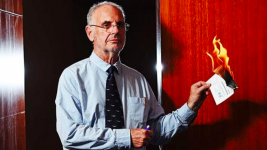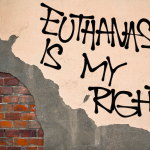Fighting for the Right to Die: An Interview with Dr Philip Nitschke

The Victorian parliament passed voluntary assisted dying legislation on November 29 last year. When the new laws come into effect in mid-2019, local residents over the age of 18, who have less than six months to live, and are suffering intolerably, will be granted access to lethal medication.
The Victorian legislation is largely modelled on assisted dying laws in the US state of Oregon, which legalised the procedure back in 1997. Indeed, there are many jurisdictions around the globe where euthanasia and assisted dying laws have been in place for decades.
Passing the end-of-life legalisation was a landmark move by the Andrews government. Although, in many ways, it highlights that Australia is lagging behind other nations in allowing the terminally ill to die with dignity.
But what many Australians don’t remember, is that this country was once the world leader in terms of euthanasia laws.
A short-lived first
On May 25 1995, the Northern Territory parliament passed the Rights of the Terminally Ill Act. It brought into play the world’s first laws that enabled a terminally ill patient to end their own life with medical assistance.
And Dr Philip Nitschke became the first doctor to legally administer a lethal injection to assist Bob Dent to end his life on September 22 1996. Under the provisions of the NT laws, the doctor assisted four terminally ill patients in ending their lives.
However, conservative forces in Canberra weren’t happy with the progressive laws in the north of the country. And using a constitutional loophole, the federal government passed the Euthanasia Laws Act 1997, which repealed the NT laws.
A freedom for all adults
After the laws were abolished, Dr Nitschke went onto form Exit International in 1997. Exit differs from other aid-in-dying organisations, as it doesn’t just profess that the terminally ill should have the choice to end their lives. It believes this decision should be available for all adults of sound mind.
According to Nitschke, the choice to decide how and when an individual end’s their life is a human rights issue, and not simply a medical one. And the doctor thinks this right should be enshrined in the law, like other fundamental rights.
It’s these kind of views that led Dr Nitschke to fall foul of the Australian medical community. In July 2014, the Australian Medical Board suspended the doctor’s registration. But, the NT Supreme Court found the ruling unlawful in July 2015. And his medical registration was restored.
However, Dr Nitschke had had enough. And on November 27 2015, he formally burnt his registration.
Exit workshops
These days, the doctor lives in the Netherlands: a country with progressive assisted dying laws. And he’s currently in Australia carrying out workshops that provide people with information regarding how to end their lives.
Sydney Criminal Lawyers® spoke to Dr Nitschke about his views on the Victorian assisted dying laws, the new 3D printable suicide machine he recently developed, and whether he thinks that the right to die could one day be enshrined in an international human rights covenant.
Firstly, Dr Nitschke, on November 29 last year, the Victorian parliament passed voluntary assisted dying legislation. What do you think about this development and the provisions of the new laws?
The Victorian government are to be congratulated for finally managing after over 20 years to bring in a piece of law, which is effectively very similar to what we had in the Northern Territory in 1996.
It was no easy feat through parliament, after there’s been 20 other attempts around Australia, which have all failed within those 20 years. So, using a parliamentary committee as way of taking some of the heat off the politicians seems to be a good strategy.
But, the law that they have passed is one which is bound to cause difficulties and problems. It is a very conservative law. In fact, Andrews has been proudly saying it the world’s most conservative law. And he’s correct. I’ve been describing it as the world’s most unworkable law.
What it means is that you are going to have to be just about dead to qualify. The large number of Exit members that we have in the country simply say, “I don’t want to have to wait around until I’m six months away from death, and then have to go and beg some doctor for permission.”
That’s the way the law is structured. When you get sick enough, you’ll have to go off and see the doctors. They’ll have to decide and assess you. And if you get lucky, and qualify, then you’ll be given the drugs.
And another point is, they can’t even guarantee that people will get Nembutal, as they’re not sure that the TGA will approve it. That means that Victorians who do finally qualify, even then are not getting the best drugs. They will be getting a second best concoction.
So, it’s not going to suit a lot of people. And if anything, it’s increased interest in Exit. We spend our time running workshops telling people where they can get those very same drugs.
But, you actually believe that all people should be able to end their own lives. And that this should be a fundamental human right.
Can you outline why you think that’s the case? And should there be any limitations to who can actually exercise this right?
It’s a position I’ve come to after a number of years. I didn’t always think that. I started off back in ‘96, believing in the very impressive piece of legislation in the Northern Territory.
In fact, it was the world’s first euthanasia legislation. The Territory is not known for progressive legislation. But, on this rare instance, they passed something that no one else had.
I was very supportive of it. And that was one of these medical model pieces of law. I thought it was alright to run around and see people. If they fitted my criteria, or those of the law, I would accept them, and give them the information. And ultimately, the drugs they needed.
But, I got challenged a lot over the years by people who said, “Look, it’s not up to you to be judging people. I make that decision. It’s my life. I decide if, and when, I get rid of it. It may be a gift, but it shouldn’t be a gift that you can’t give away.”
And I became much more of a believer in that concept. People said, “It’s not some sort of privilege if you satisfy some criteria that the law and the medical profession dictate. It really is something that is much more fundamental than that.”
Exit, as an organisation, has moved down that path now, saying that it is a fundamental human right. One criterion is you need to be a rational adult. Not a child. So, if you are a rational adult, you should be able to have information to allow you to take this course.
And ultimately, with good information you won’t have any difficulty getting the drugs, and being able to take that step yourself, in a reliable and peaceful way.
Last August, you were in the Northern Territory and South Australia conducting workshops about how to end one’s life.
What sort of people attend your workshops? And without divulging too much, what sort of information do you provide them with?
Tomorrow, we’re starting up another run down the east coast of Australia. We have one tomorrow in Lismore. There will be about 200 people there. And they will be about 75 years of age on average. They will be people that are well. They are not sick generally.
They’ve often got a bit wrong with them. Most people do at that age. But, they are not terminally ill by any means. They’re just people that are well aware, because they’ve got to this age, that things at the end of life aren’t always rosy. And they want to know that they’ve got their own little safety net in place, in case things go wrong.
They also know that if someone does get themselves into trouble, and are desperate to get help to die, under current legislation, anyone who helps someone to die, can be looking at serious legal penalties.
In Queensland, it can be up to life imprisonment. In NSW, you can spend 14 years in Long Bay for helping someone end their life. Whereas, suicide itself is not a crime.
I explain to them, and they by and large agree, that it’s better to have the drugs safely stored, so that if you need them, you can just go and get your own drugs, and take them and die.
This is better than doing nothing, and then when you get too sick to do anything, having to beg your wife or husband to get on the plane and fly over to Tijuana or Peru, and buy the drugs over-the-counter, and bring them back. Because, that’s assisting, and that’s what could well lead your wife or husband into serious legal problems.
They’ll come along to the workshop, and they’ll want to know what the drugs are? How do they get them? What are the best drugs? What are the non-drug methods? And of course, there are some very effective and peaceful ways using gas. And they want to know about that.
And they also want to know what some of the pitfalls and traps are. That is, what are some of the mistakes you can make, such as buying the wrong drugs, and getting drugs you are not sure of. They want to learn how to test the drugs – who does that and how is that done? What are the costs of the drugs? What are the legal issues of buying them?
And in terms of the gases, what are they? How do the gases work? Why do they work? Often people don’t understand.
It’s all about the practicalities of ending your own life.
You believe that this sort of information, and making those sort of preparations, actually improves a person’s end of life.
I do. What we see a lot is that you get a big room full of 70-year-olds, and when they know what it is that they can do, and know how to do it, they stop worrying and they relax.
And we find, anecdotally, when people get their Nembutal sent in illegally from China, after they paid $700 in Bitcoins for it, and stash it safely under the bed, with a shelf life of 25 years, that they stop worrying.
They hope they never want it. But, knowing they’ve got it is immensely comforting. And then they can actually get on with life, knowing that, “Well, if everything does go bad, I’ve always got that.” It’s like a safety net, which actually empowers people to make them feel like they’re back in control.
Last November, you announced that you invented a new suicide machine that has a coffin attached, and can be 3D printed. The Sarco allows a person to sit inside and release liquid nitrogen, which puts them to death within a matter of minutes.
You’ve said the first model will be built in Switzerland early this year, and in the future, it could be available in Australia.
As you just mentioned, in this country, it’s not a crime to commit suicide. But, it is a crime to assist in the act in any way.
So, how would an individual be able to supply a person with the details, or the ability, to use a machine like the Sarco, and not be criminally complicit in their suicide?
Telling people about it, explaining how it works, and giving them the program for 3D printing is a bit equivalent to publishing information about what drugs end your life, and what drugs don’t.
We published this information in our handbook, which has become the world’s bestselling handbook on how to end your own life. It’s banned in Australia. There’s never been any action taken against me as the author, and thereby being complicit in assisting with a person’s suicide.
We would see the actual provision of the program material for the printing of the Sarco to be in the same legal situation as that. I doubt there will be any trouble there.
If a person wants to use one of these machines, they will need to get the program, which we will be putting up open-source on the internet. So, anyone can have it. We’re not trying to sell these things. And then they will have to take it off to a 3D printer and have it printed. They will then have to climb into it and press the button.
The point about all that is it’s them clearly indicating that they want to end their life. So, it’s very much an act of suicide, which is not a crime anywhere in Australia. And they will have to do the preliminary organising.
Obviously, if you go and print one out for your wife, and then she climbs in it, you may well find yourself in trouble. But, I don’t believe that Exit, or myself as the designer, is likely to be in any trouble for simply making the information available about how to do this, and why it works.
Exit was also runs a “brewing company,” which sells nitrogen supplies that can be used in the production of beer, or a person can also utilise in taking their own life.
I gather in the same way those supplying the nitrogen aren’t complicit if a person uses it to take their own life. But, have authorities attempted to shut down the operation?
No. They haven’t attempted to. It’s a well understood strategy to use nitrogen to end your life.
I guess the authorities have become use to the idea of finding people using what is effectively a piece of equipment that can be used for brewing, as well as a way of attaining a peaceful death. Hundreds of people have made use of that method.
It’s quite common for us to be contacted by policing authorities saying that one of our members has been found to have ended their lives and to have used nitrogen: the Max Dog Brewing equipment. And in fact, in some cases they’ve suggested that the equipment might be returned to the organisation.
And so, there’s an understanding that if people want to end their lives, and this is a reliable and peaceful way, they should be able to have that option in place. And we’ve never been challenged for the provision of that equipment.
Obviously, if I went around giving out Nembutal to people, I don’t think I would last five minutes. Because that is clearly assisting in their suicide.
But, with the provision of something that can be used in a lot of ways, such as brewing, it’s a lot harder to make that connection. It would be a little like complaining to Bunnings for selling rope that people hang themselves with.
There’s too much of a disconnect between the item that people are acquiring, and the fact that it is ultimately used to end their lives.
Back in 1996, you were the first doctor in the world to legally administer a lethal voluntary injection to assist a terminally ill man in dying in the Northern Territory.
What sort of factors brought about the enactment of the world’s first euthanasia laws in the Territory back in the mid-1990s?
People often ask, “Why did it happen there?” As I said, it’s not the world’s most progressive place in a lot of ways. It was a bit of a surprise to me. I was working up there as a doctor at the time. I didn’t have a lot of experience medically.
I heard that Marshall Perron, the chief minister, was proposing the laws. I thought it was a good idea and went back to sleep. But, the opposition from the medical profession was intense. And then the Church weighed in. And it looked for a while like it was not going to go anywhere.
The unique things about the Territory that made it happen were the fact that the Territory is the most secular place in Australia. So, the Church has less influence.
Perron had an immense personal following. He was a popular conservative politician. And people liked him. But, people in Australia are very supportive of these laws. It’s not as though people don’t want them.
The question is, why did it happen in the Northern Territory, given that it had never happened anywhere else? There’s Perron. The fact that it is a secular place. And also, there’s one final thing, and that’s the Territory have got a sort of a “go to hell” attitude to the rest of Australia.
When they heard there was a lot of criticism coming from the other states, the general Territory response was, “Go to hell. We do things our own way up here.” It was almost like putting the finger up to the rest of the nation. We were going to do it because we were tough, different, and unique.
But, of course, that ultimately spelt its demise. Because, after it came in, five months later the federal government used the weakness of the Territory constitution – that it’s a territory, and not a state – to effectively overturn the law.
The Kevin Andrews bill made a law that says no territory can ever make a law on euthanasia. So, then it meant that the ACT and the Northern Territory could never do it. It was then up to the states. And 20 years later, Victoria has finally done it. But, with a very difficult and almost unworkable law.
And what sort of political forces were behind overturning the law in March 1997?
It was a coordinated bipartisan thing, which was interesting for Canberra. We had Tony Burke in the Labor party. And we had Kevin Andrews, the conservative. They both worked together. They were both strongly driven by their religious beliefs. And they had very strong support of then prime minister John Howard.
They put their strategist to work on how they could do it, given that it was pretty popular up in the Northern Territory. And they stumbled upon this fact that the Territory did have this constitutional weakness. That is, that all of its laws can ultimately be reviewed, challenged and overturned by the federal government. The states don’t have that vulnerability.
Perron was aware of its possibility. And when he first started, he approached the then prime minister Paul Keating. And in 1994, Keating said, “If the Territory wants to do it, I would not foresee any federal involvement.”
In ’96, Howard came in. The political climate changed. He was best mates with Kevin Andrews. And with the right of the Labor party agreeing, it was the end of the road for the Territory law.
These days you live in the Netherlands, where doctor assisted suicide is legal. What do the laws provide in that country? And how would you say the attitudes towards euthanasia are over there, compared with those you find over here?
The Netherlands law came in a few years after the Northern Territory. And they’ve had the laws in place for a long time. They’ve changed over the years. They’ve gotten rid of some of their age restrictions now. A person can be younger than 18. And they allowed other flexibilities.
Many people say the Dutch experience is an example of what goes wrong when you bring in these laws.
But, it’s a place where people are very comfortable with this idea. The Netherlands is the only place in the world where we’re now seeing a debate about moving from the so-called medical model, where it’s a privilege granted if you are sick enough by the medical profession, to the rights model.
The argument is, and it’s been put to the Dutch parliament, that every person over a certain age should be given the drugs as a matter of course. They’ve chosen 70.
Now that’s the first example of a rights model, which is what we strongly believe in. In the Netherlands, over half of the people agree with it, and it’s rising all the time. So, we will see the first example of a working rights model in the Netherlands.
It’s an easy environment for me to live in, and express these ideas, and to not be seen as dangerous.
Things got really difficult in Australia, which is one of the reasons why I wanted to leave. And certainly, it drew to a head over this issue of whether it’s a right.
This brought up the issue of Nigel Brayley over in the west, where there was a person about to be gaoled for 20 to 30 years. It was the idea of whether it should be a right, or whether he’s a person who would never have qualified for medical assistance, because he wasn’t sick.
Those issues became a source of anxiety and concern. In Australia, the medical board moved to try and censor me. They banned my book: The Peaceful Pill Handbook. They made my life as difficult as possible.
Finally, they said you can’t author your book, unless I took my name off the cover, if I wanted to be medically registered. So, I thought I don’t approve of all of this. I burnt my medical registration and headed off out of the country, where it’s a lot easier an environment.
Nevertheless, we’ve got an awful lot of members here. We have to come back, and make sure that they get the new and ever-changing information. There are new do-it-yourself options all the time, which gives people total control.
And lastly, you’ve just touched on this, but, do you foresee a time when a more formalised right to die will be enshrined in international law? And if so, what do you think it would take to bring this about?
I see it as an evolutionary process going on around the world. It’s really a function of countries, where people are exposed to western medicine, and can be kept alive almost indefinitely. And in some sort of hopeless quality.
As people get exposed to the miracle of western medicine, along with that comes this idea that people also want to be better in control. They don’t want to be caught up in some medical nightmare at the end of their life.
So, the countries which have access to very good, modern medical care are often the countries where people see this as being a pressing need for change.
The other issue is that there is an aging population of baby boomers, who are used to being in control of their lives. They are not the sort of people you can pat on the head and say, “Look, we’ll do the worrying for you.” They want to run the show for themselves.
That sentiment of being in control, aging people, and access to modern western medicine are all driving the demand. And that’s being played out with this idea of the Tired of Life legislation in the Dutch parliament. That everyone over a certain age gets the drug.
When will this spill back into a country like Australia? Obviously, we led the world back in ’96. And now, of course, we trail rather badly. Because, while we’ve been procrastinating here for 20 years, there’s the Netherlands, there’s Belgium, Luxembourg, and there’s also California, Oregon, Washington, and there’s Canada.
All of these places have changed in the 20 years, while Australia has been standing on its hands doing nothing but worrying about it. And now finally, under great difficulty, this embryonic piece of law has been passed in Victoria.
There may be a bit of a catch up now. But, we’re going to see the change sweeping across the world. And currently, I’m living in the place where we’re seeing the vanguard of that whole movement to give total choice back to people when they come to the end of their lives.
A lot of people in the community struggle with their mental health. If you are, you can seek help from these organisations:Lifeline on 13 11 14; Kids Helpline on 1800 551 800; MensLine Australia on 1300 789 978; beyondblue on 1300 224 636







